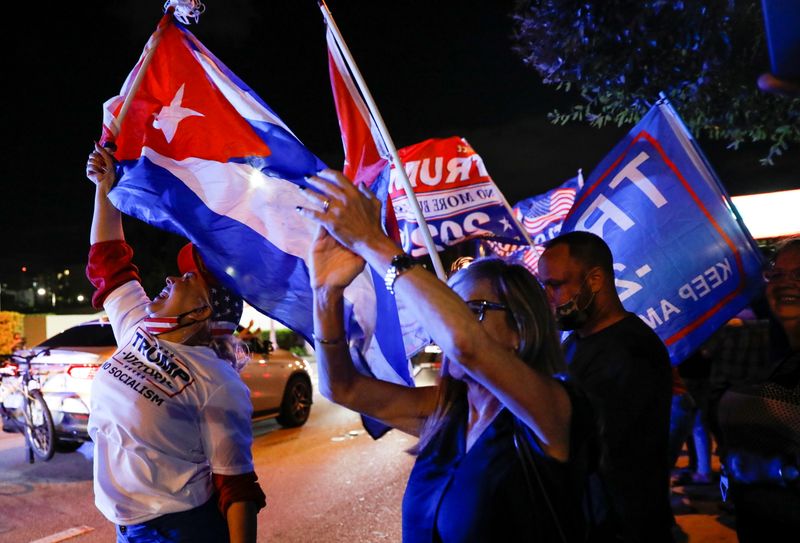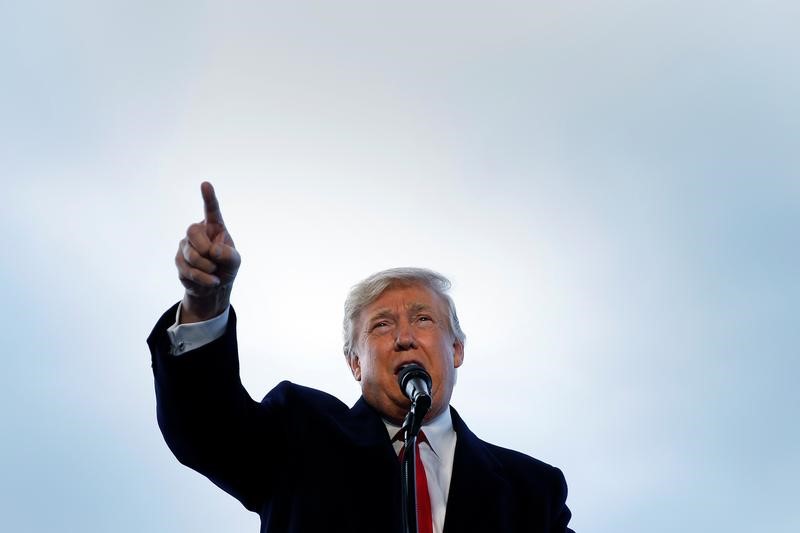By Simon Lewis and Zachary Fagenson
LITTLE HAVANA, Florida (Reuters) - A wave of support from Hispanic voters gave President Donald Trump a narrow but decisive victory in Florida on Tuesday night, helping him secure the state that has long been seen as a bellwether battleground.
Trump, who also won the state four years ago, outperformed his 2016 margins with Florida's Hispanics, who make up 19% of the state's voters. A lot of the swing came in Miami-Dade, the county that contains Florida's largest Cuban and Venezuelan communities.
Many Americans of Cuban and Venezuelan backgrounds left countries that they considered were ruined by socialist policies. So when Trump and his allies painted opponent Joe Biden, a moderate Democrat, as either a socialist himself, or in hock to the "radical left," that struck home, some Miami voters told Reuters.
Trump won Texas and also ate into Latinos' support for Democrats in that state, results showed. An overall U.S. presidential election result is still pending as ballots continue to be counted.
Nationally, Trump got a higher proportion of support from non-white voters than he did in 2016, according to Edison Research exit polls, helping offset a decline in support among whites. Support for Trump this year rose by three points among all Latinos, and 15 points among older ones; it jumped by 11 points among Black voters between aged 30 to 44.
Some election observers had thought that Trump's harsh stance on immigration, and his administration's treatment of asylum-seekers - often from Central America - would hurt him more among those of Hispanic background.
But Latinos are a widely disparate group, and many hold religious or conservative views that chime with those of Trump.
"The Latino surge is real, and it is happening across the country," White House spokeswoman Kayleigh McEnany wrote in a tweet Tuesday night.
Biden can still win the election with victories in other states. If he loses, some of the blame can be laid on his failure to engage with Latino voters, said Jaime Regalado, a political science professor at California State University in Los Angeles.
"He just wasn't there," Regalado said. "He didn't spend a lot of time courting Latinos until the final two weeks of the campaign. It could turn out to be a huge mistake."
The Biden campaign had no comment Tuesday night, but the campaign has in past weeks disputed criticism from some Democrats that it was not sufficiently focused on this demographic.
Exit poll data showed Trump was winning about 47% of the Hispanic vote in Florida, increasing his vote share over 2016 by about 12 percentage points. Trump won 56% among those of Cuban descent, the data show.
That swing denied Biden the votes he needed from South Florida to balance Trump strength in the state's mainly rural Panhandle, and win Florida's 29 Electoral College votes.
Texas's Starr County, which is 99% Latino, had an even more dramatic shift - in 2016, fewer than 19% of the votes went to Trump; this year he won nearly half of the vote.
'OPPORTUNITY, NOT HANDOUTS'
Jose Cuevas, 62, owner of a cabinet manufacturing company, was celebrating Trump's victory at Versailles, a popular Cuban hangout in Little Havana on Tuesday night. He said he arrived in the United States in 1968 as Cubans escaped communism.
"We had everything taken away from us. We were adopted by the United States with open arms," said Cuevas.
"We came here for opportunity, not handouts. I firmly believe it's that welfare mentality that Democrats sell to create their base and that goes against Cubans completely."
Biden, a three-decade senator who voted for free trade agreements and calls himself a capitalist, beat Bernie Sanders, a democratic socialist senator from Vermont, in the Democratic Party's nominating contest with promises of more moderate policies.
Nonetheless, Trump's efforts to cast Democrats as socialist may have been crucial in Florida, said Sergio Garcia-Rios, a professor of Government and Latino studies at Cornell University. "That mobilized a lot of Cuban-Americans," he said.
Trump's hardline policies on Cuba and Venezuela may also have played a role. Trump aides have said these were aimed in part at currying favor with the large Cuban-American community in south Florida.
Trump has waged a 'maximum pressure' campaign of economic sanctions and diplomatic measures against Venezuela's left-wing President Nicolas Maduro, a Cuban ally, and rolled back much of Democratic predecessor Barack Obama's detente with Havana.
Republican Party of Florida Chairman Joe Gruters said Trump's message had resonated with many voters in South Florida. "People want safety and security in their communities. They want freedom and liberty. They don't want to go backwards," said Gruters. "They want to live in a capitalist society where anybody has the chance to move up and do well for themselves."
Trump also appealed to evangelical Hispanic voters, holding an event at 7,000-capacity King Jesus International Ministry church in Miami in January.

The Biden campaign opted to focus on Puerto Ricans in Florida because that community has grown since Hurricane Maria in 2017, one person briefed on the campaign strategy said.
